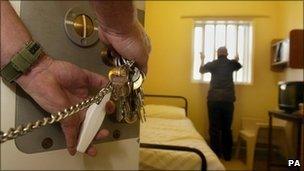Prison Reform Trust: Let prisoners use the internet
- Published

Some prisoners can already send secure e-mails but the report calls for this to be extended
Giving certain prisoners controlled and "fully supervised" access to the internet could help rehabilitation and cut re-offending, a report says.
The Prison Reform Trust and Prisoners Education Trust said, external it could boost training and help maintain family ties.
Chief Inspector of Prisons Nick Hardwick said prisons were in a "pre-internet dark age" which left inmates "woefully unprepared" on release.
The government said offenders' benefits must be weighed against security needs.
The two organisations, which campaign for improved conditions and educational opportunities for prisoners in UK jails, said the majority of prisoners should have access to secure web content for the "purposes of rehabilitation".
'Digital divide'
More inmates should have access to secure e-mail networks, while low-risk Category D prisoners, who are eligible for release on temporary licence and can access the internet on work placements in the community, should have "enhanced access" to online resources when back in prison.
This, it argued, would make them better equipped to apply for housing support and to seek work and education opportunities upon their release.
The organisations said their research suggested there was strong support among inmates themselves and prisoners' families for greater access to technology.
Of the 42 prison managers that they surveyed, they said 74% believed that prisoners should have secured and controlled access to the internet while 67% said inmates should be allowed to set up bank accounts online.
The report listed a range of security concerns about the current use of computers in prisons, including their use to plan escape attempts, to charge illegal mobile phones, to store prohibited images and intimidate victims and witnesses.
While supporting wider access to the internet, the report said it must be limited to vetted prisoners, be fully supervised, restricted to approved sites, traceable through a pin system and all internet activity monitored.
'Financial constraints'
In a foreword to the report, Mr Hardwick said security concerns could be overcome as technology "allows every key stroke to be monitored and access can be risk-assessed".
Changes in attitudes to technology in prisons were "long overdue" as current practices was "inefficient and wasteful", he stated.
On a visit to British troops in Afghanistan, Mr Hardwick said he had witnessed Taliban detainees being allowed to use Skype to speak to their families yet many prisoners were "excluded" from this kind of interaction.
"Most prisoners are placed at the far end of the digital divide," he wrote.
"Neither helped to obtain any of the benefits these new technologies bring nor supported and supervised to avoid its risks. We can't go on with prisons in a pre-internet dark age."
He added: "Perhaps there are some who will say computers and the internet are luxuries prisoners should do without.
"There was probably some grumbling when they first put telephones on the wings too and if we want prisons to rehabilitate those they hold, we have to give them the tools to do so."
Privileges
The Ministry of Justice said it agreed with the Prison Reform Trust that IT could help prisoners "learn skills that will help in their rehabilitation and reduce their risk of reoffending".
It said the virtual campus prison intranet system already gave prisoners access to help with resettlement, skills and employment - although critics say the material needs to be significantly improved.
"We continue to look at further ways of helping prisoners learn about IT," a spokesman added.
"However, we have to balance needs of offenders with the need for security and financial constraints."
The government has recently announced a crackdown on "perks" enjoyed by prisoners, such as the freedom to watch satellite football matches and 18 certificate films, saying they must do more to earn such privileges.
Changes also being introduced will see the working day lengthened for prisoners and institutions able to recover the cost of damage to cells from prisoners.
- Published30 September 2013
- Published30 April 2013